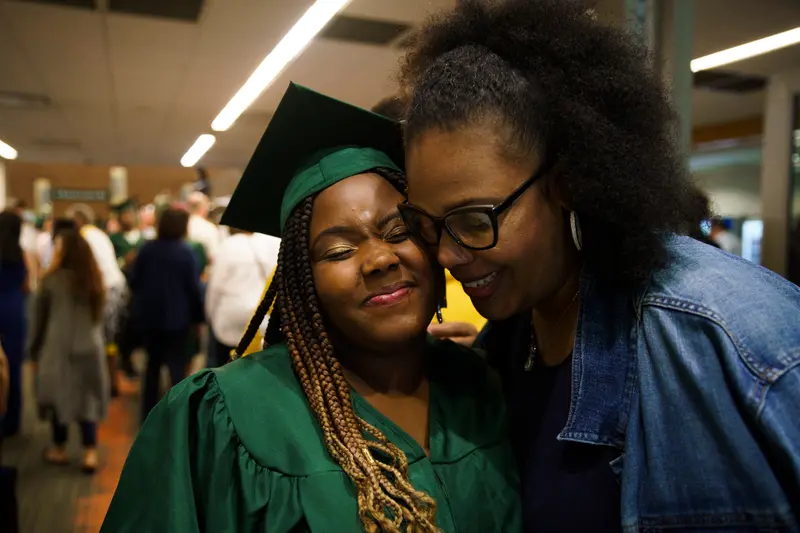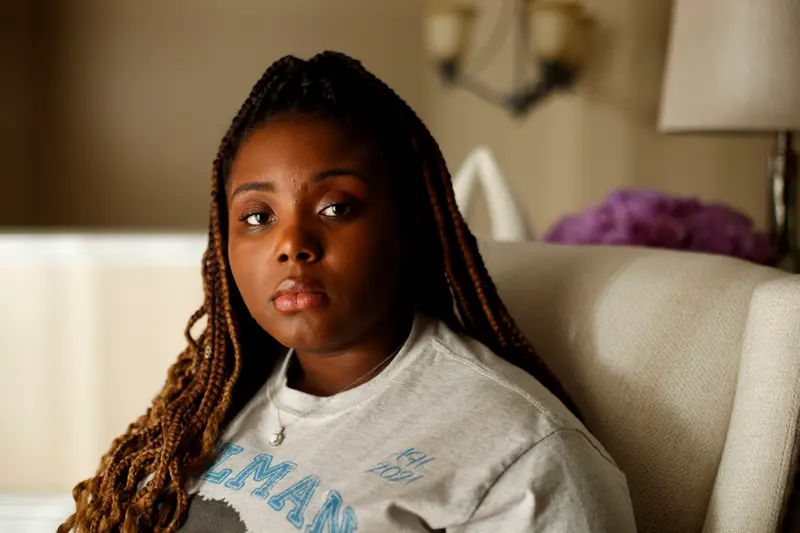Update, Aug. 7, 2023: A jury trial in this case is expected to begin Aug. 8 at the DuPage County Courthouse and continue for up to three days. The defendant, Amara Harris, is now 20 and entering her senior year at Spelman College in Atlanta. Her case is being decided as Illinois lawmakers and school officials consider whether students should be ticketed at school. ProPublica reporters Jodi S. Cohen and Jennifer Smith Richards will cover the trial and provide updates on Twitter and Threads.
From the moment Amara Harris was accused of stealing another student’s AirPods at Naperville North High School, she has insisted that it was a mix-up, not a theft.
She told a school dean that she thought the AirPods were her own, having picked them up a few days earlier in the school’s learning commons, where she said she thought she had left her own set. Her mother repeatedly told officers that her daughter hadn’t stolen the wireless earbuds, records show.
Still, the school resource officer wrote Amara a ticket in 2019 for violating a municipal ordinance against theft. Paying a fine would have made the matter go away, but Amara says she won’t admit to something she didn’t do. For two and a half years, she has repeatedly gone to court to assert her innocence, even delaying her plans to attend on-campus classes at her dream school, Spelman College.
Now, in a rare and dramatic example of the impact of school ticketing, the case is headed for a jury trial, with the next court date on Tuesday. As Naperville continues to prosecute the case, Amara and her mother have racked up far more in legal bills than the city’s highest fine would have cost them.
“I am innocent. I am fighting because I don’t want this to happen to anyone else,” said Amara, now 19. “Why would I say I’m innocent to everyone but then I lie in court and say I’m guilty? It doesn’t make sense to me.”
This spring, in the investigation “The Price Kids Pay,” ProPublica and the Chicago Tribune exposed the widespread practice of school officials and local police working together to ticket Illinois students for misbehavior at school, resulting in fines that can cost hundreds of dollars. Reporters documented about 12,000 tickets issued for possession of vaping devices and cannabis, disorderly conduct, truancy and other violations from August 2018 through June 2021.
Ticketing students for their behavior in school skirts a state law that bans schools from disciplining students with monetary fines. Immediately after the report was published, state officials including Gov. J.B. Pritzker and the state schools superintendent said they intended to put a stop to the practice.
The superintendent, Carmen Ayala, chided schools for outsourcing discipline to police and urged them to stop. The Illinois attorney general’s office, concerned that school ticketing was violating the civil rights of students of color, launched an investigation into a large suburban high school district and said it might investigate others.
But none of the state officials addressed how to deal with pending cases of students who, like Amara, had already been ticketed.
“The governor says he wants this to stop, he wants this to end,” said Amara’s mother, Marla Baker. “We are in the middle of it.”
Amara’s family, like so many others, was thrown into a system that uses a lower standard of proof than a criminal court. People ticketed for ordinance violations can be held responsible if the allegation is deemed more likely to be true than not, and the ticket itself is considered evidence. At every turn, the system and the officials in it encourage families to admit liability and pay a fine. And most do.
During a year of reporting on student ticketing that included attending more than 50 days of hearings, Tribune and ProPublica reporters met dozens of students and parents who paid fines even though they believed police didn’t need to be involved in the first place. Some were initially inclined to fight the citations but eventually gave up, worn down by the process.
Amara’s case demonstrates the extraordinary effort it can take to argue against a ticket in a system built for assembly-line justice. Hers is the first case the Tribune and ProPublica have encountered that could go before a jury; Naperville officials said the city hasn’t had a jury trial for an ordinance violation in at least a decade.
The ticket is a civil matter, so there’s no threat of jail time. But Amara said she is committed to clearing her name.
To Amara and her mother, the ticket — and the city’s commitment to prosecuting it — is another example of people in power discriminating against Black children. Only about 120 of the roughly 2,700 students at Naperville North are Black, and Baker has spoken out in the past about what she sees as racism and bias in the city’s schools.
A Naperville city spokesperson, responding on behalf of the city and its police department, said “the City categorically denies that race in any way played a factor in this case.”
Spokesperson Linda LaCloche declined to answer specific questions about the police investigation because Amara’s court case is pending. The spokesperson attributed the case’s slow progress to court closures caused by the COVID-19 pandemic, Amara’s change in attorneys and court scheduling issues, among other reasons.
The officer who wrote the ticket, Juan Leon, declined to discuss the case but said it was “unbelievable” that it was still pending. He blamed Baker for dragging it out.
A Naperville Community Unit School District 203 spokesperson distanced the district from the case, saying: “Naperville 203 does not ticket students.” Spokesperson Alex Mayster said school officials rely on school resource officers, who work for the city’s police department, when a disciplinary matter may involve a law being broken. State schools chief Ayala has said schools that take this approach are “abdicating their responsibility.”
Amara’s family so far has paid at least $2,000 in lawyer fees to fight the case, Baker said. She and Amara stopped working with their most recent attorney in part because of the cost of going to trial and his recommendation that they accept a plea deal.
If there’s a trial, Amara may have to defend herself. Still, she said, she is not going to quit and allow the ticket to blemish her hard-earned school record. She made the honor roll at Naperville North, participated in school activities including cheerleading and the step team, served as an aide in the classroom and for the school deans and, in 2020, graduated from high school ahead of schedule. She said she has interned at the Brookfield Zoo and hopes to become a veterinarian.
“They are taking away all of my accomplishments that I have worked hard for and substituting it with an accident that happened,” she said. “To define me as a person — that is not who I am.”
The AirPods investigation began in November 2019, when a school dean told the school police officer he had received a voicemail from a father who said his daughter’s AirPods had been stolen. Two of the school’s deans then began gathering information, according to the Naperville police report that summarizes how the school and police handled the incident.
Amara became part of the investigation, the report states, when the girl whose AirPods had gone missing reported something she had been told by a friend. During class, the friend saw Amara’s name pop up on her own laptop connected to AirPods that she thought belonged to the girl, the report says. The friend informed the girl, who then went to the school administration.
That same day, Dean Jim Konrad went to Amara’s classroom to speak with her. According to the police report, Amara told the dean she had purchased AirPods months earlier and handed Konrad the ones in her possession. They turned out to match the serial number provided by the other student.
“Amara stated that she did not know how this happened, and told him she thought they were hers,” the police report stated, recounting the conversation between the dean and Amara, then a 17-year-old junior.
The report said nothing more about Amara’s explanation for having the other girl’s AirPods.
“They never talked to me, never asked me what happened,” Amara said in an interview with ProPublica and the Tribune. But what she’d tell them is simple, she said: “I would tell them I found them in the exact location where I thought I misplaced them.”
Baker said she showed a receipt to school administrators and later to police to prove that Amara owned a set of AirPods and to show that Amara had reason to believe the ones she picked up were hers. Amara said using the other girl’s AirPods was seamless and there was no indication they belonged to someone else.
The police report makes no mention of the receipt.
After speaking with Amara, the dean went back to the police officer. The two of them agreed to call Amara’s mother, but before that happened, a fire alarm went off at the school. Amara, meanwhile, called Baker on her own. According to the police report, Baker came to the school and “started to yell” that school officials had “interrogated” Amara. She then left with Amara.
The school resource officer then called the father of the girl whose AirPods were missing. He told the officer he was glad his daughter had her AirPods back but he wanted Amara charged with theft, according to the police report. The officer said he explained “the different possible consequences toward Amara.”
School officials didn’t discipline Amara, she and her mother said, but the police continued to pursue the matter. Two weeks later Baker met with the school resource officer and a sergeant at the police station. Baker brought the former police chief of Aurora, who is retired but acts as a liaison between police and Black community members in the Chicago area. Amara was not present.
At that meeting, the Naperville school resource officer explained that he was issuing Amara a city ordinance citation for theft. According to the police report and the former police chief, Baker insisted “there was no theft” and would not accept the ticket. The officer wrote “Refused” on the signature line for the defendant when Baker declined to sign the citation.
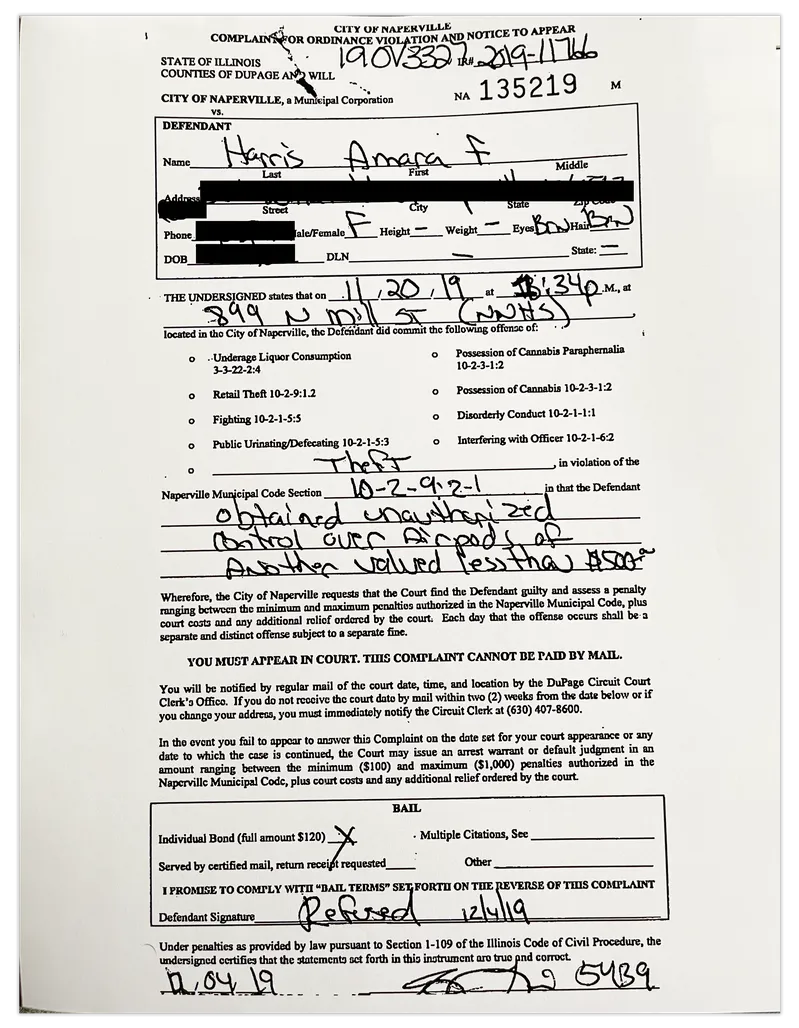
“Something just wasn’t right,” said William Powell, the former Aurora police chief, who now works with the National Organization of Black Law Enforcement Executives. “When her daughter was accused of taking these AirPods, they wanted to jump on her daughter right away and press charges.”
Powell said he was troubled that the police wouldn’t explain why they believed it was theft and not a mix-up. He said he thought the police were dismissive and acted like the ticket was not a big deal.
“They said, ‘She’s not being charged, she’s being ticketed,’” he said. “It doesn’t make any difference — she’s still in the system. I felt that it might not have been investigated thoroughly.”
When racist incidents in Naperville schools caught the nation’s attention a few years ago — one student was accused of posting an online ad with a photo of a Black student that said “slave for sale” — Baker spoke out.
At a community meeting and to reporters, she described how her son had been bullied in middle school, with classmates using slurs and sending him photos of a noose and of the Ku Klux Klan.
When Amara was ticketed for theft soon after that community forum, Amara and her mother felt like it was another injustice.
“We moved to Naperville for a better education, not to be marginalized where [if] she has a situation, she is sent all the way to court,” said Baker, who moved in 2016 with her family from Carbondale in southern Illinois.
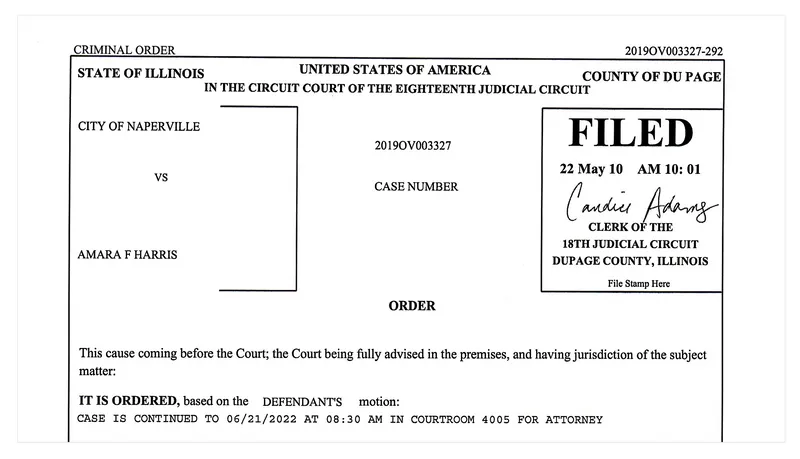
A Naperville Community Unit School District 203 spokesperson said the district has worked to address concerns raised in 2019 about systemic racial inequities, including by adopting an equity resolution that commits to ending racial injustice, offering districtwide implicit bias training and examining hiring and requirement practices.
For “The Price Kids Pay,” the Tribune and ProPublica were able to identify racial disparities in school-based ticketing in some districts. But that type of analysis wasn’t possible for Naperville because ticket records obtained from the city’s police department didn’t indicate the race of the young people cited.
To fight Amara’s ticket, Baker hired a lawyer and also reached out to representatives from the NAACP and other advocacy groups. She started an online petition. She appealed to members of the Naperville City Council and to the mayor in an email urging them to dismiss the citation.
“Let her move on with her life and finally be able to attend college in person,” she wrote in March. “Let her move on from this false allegation that should have stayed as a simple school disciplinary issue.”
But the city’s prosecution of Amara continued. To make it easier to appear in DuPage County court, Amara has been taking her Spelman classes online, delaying a move to Atlanta. To pay her legal fees, she dipped into money she had saved for school as well as paychecks from a recent job.
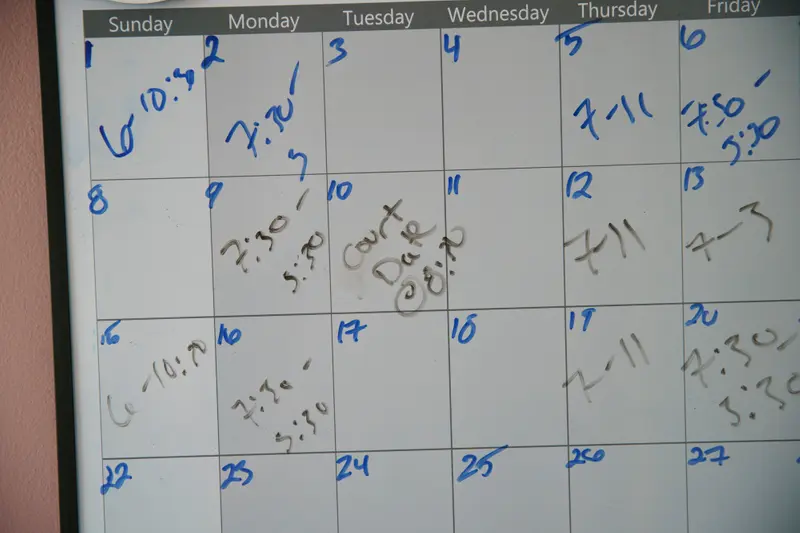
Earlier this year, a second lawyer representing Amara negotiated a potential plea agreement in which the city would dismiss the case if Amara paid a $100 fine plus $100 court costs. She would also have to concede that if she went to trial, the city would present a case and it was possible that she could be found guilty.
Amara wouldn’t agree to that deal and requested a jury trial. Her mother was angry. She wanted the lawyer to fight for a full vindication and felt that the plea deal would have undercut their pursuit of justice. The lawyer withdrew from the case.
“I just can’t tell my daughter to plead to something you didn’t do,” Baker said. She also acknowledges that it’s hard to know at this point what would feel like a win in Amara’s case. “I feel like no matter what, even if they dismiss it and we walk away from it, she still lost.”
When reporters asked Naperville officials about Amara’s case, city spokesperson LaCloche suggested the matter could have been resolved without a ticket. She said the decision to issue the citation was made by police after they “initially considered addressing this matter via an informal out-of-court resolution.”
Baker and Amara said police never indicated there was an alternative to a ticket and they were shocked to hear what the city told reporters. Powell, the former police chief, said no other option was mentioned in the meeting he attended.
“If you didn’t want to give the ticket, what parent would be like, ‘No, no, no — give me the ticket’?” Baker said. “If that was always the case, you still have the power to do so now. That is ridiculous to me.”
The father of the student who reported her AirPods missing in 2019 said he did not realize the case was still going on. He declined to comment further, saying he didn’t want anything to do with it.
After lawmakers said in April that they planned to take action on police ticketing at school in response to “The Price Kids Pay,” Baker renewed her efforts to get authorities to help them. She contacted a state senator and the Illinois State Board of Education. A board employee last week told Baker that she couldn’t help because the case isn’t under school jurisdiction any longer — it’s a court matter. She encouraged Baker to email the state superintendent.
Amara and her mother also reached out to ProPublica and the Tribune through a form asking students and parents to contact reporters about their experiences.
Throughout the case, Amara has remained focused on her academic goals. In addition to taking online classes at Spelman, she also enrolled at a local community college. By May 20, she had earned enough credits for an associate degree in science from the College of DuPage.
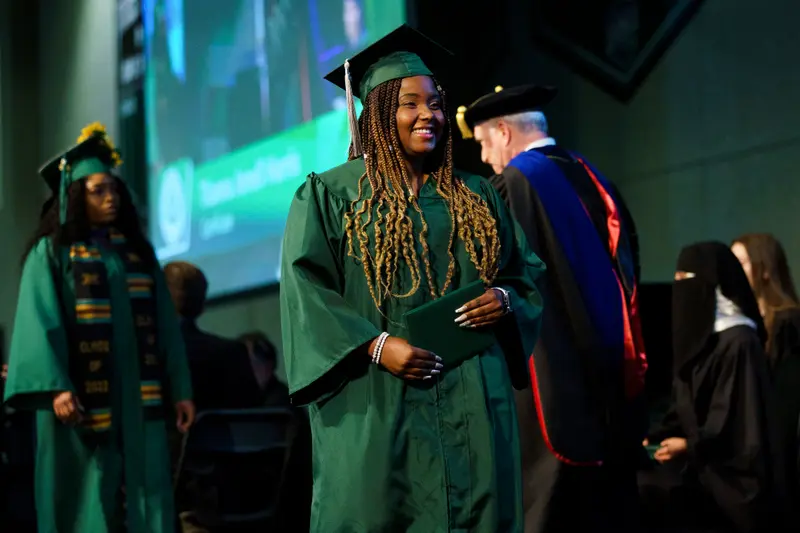
On graduation day, Amara put her green gown on over a white flowered outfit and fitted her cap over her long braids. Baker made a point of saying that she didn’t want Amara to think about court on that day.
“I want you to enjoy this, I really do. I want you to block everything else out,” Baker said when she and Amara went outside to take photos. “I hope this will encourage you to keep going, and you’re halfway there already.”
But the ticket still looms. On a whiteboard in her bedroom, Amara marks the court dates alongside her work schedule.
She and her mother say they desperately need the case to end before summer’s over so Amara can head to Spelman. “Somebody’s going to come to help us,” Baker said.
